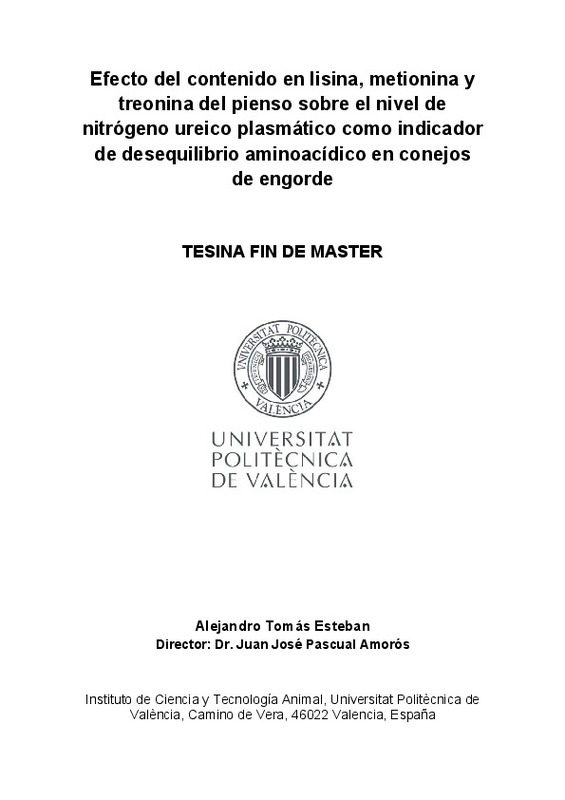|
Resumen:
|
[ES] Optimización del contenido en aminoácidos limitantes en dietas de engorde de conejos en función de su velocidad de crecimiento.
[EN] Nowadays, dietary protein level of fattening rabbits has been r
educed to avoid
frequent gastrointestinal problem
s observed during this period
and to minimize
the environmental impact. This r
eduction ...[+]
[EN] Nowadays, dietary protein level of fattening rabbits has been r
educed to avoid
frequent gastrointestinal problem
s observed during this period
and to minimize
the environmental impact. This r
eduction seems not be affecting
commercial
crossbred fattening rabbits, but those coming from lines highly
selected for growth
rate, seem to be not expressing all their genetic potential wit
h under these
conditions, widely affecting t
he genetic rankings and consequen
tly adequate
genetic material diffusion. Theref
ore, this thesis is an initia
l attempt to determine
the optimal levels of Lysine (Lys), sulphurous amino acid (Meth
ionine and
Cysteine) and Threonine (Thr) in function of growth rate of rab
bits, through a
matrix of 27 feeds and, using the
Plasmatic Ureic Nitrogen (PUN
) level as a
indicator of dietary amino acids imbalance. The study enrolled
432 rabbits,
belonging to the R and V lines of Polytechnic University of Val
encia, selected by
growth rate and litter size, respectively. Each experimental fe
ed was randomly
assigned to each cage group of 8 rabbits, composed by animals f
rom both genetic
types, for a total of 27 cages per batch and two batches. The a
verage daily gain
(ADG) was significantly higher f
or the R-line, and similarly, a
verage PUN level on
R line (16.43±0.19 mg/
dL; P<0.001) was greater that observed fo
r the V-line
(14.56±0.38 mg/dL; P<0.001). A po
ssible explanation could be re
lated to a
greater amino acid imbalance on hi
gh growth rate animals. As re
gards
differences on PUN level in function of dietary levels of Lys,
sulphurous amino
acid and Thr, average PUN reached the lowest levels for the med
ium level of
dietary Lys (7.3 g Lys/kg DM), as well as for the medium level
of dietary sulphur
amino acids (5.2 g Met/kg DM),
as suggested by the literature.
However, average
PUN was reached the lowest level
s only with the lowest dietary
Thr level
evaluated (5.3 g Thr/kg DM), per
haps suggesting that current Th
r
recommendations (6.2 g Thr/kg DM) are over-estimated. These fin
dings
represent preliminary results; f
urther research will build on t
his thesis to calculate
the requirements of essential am
ino acid based on ADG (with 4 a
dditional
batches).
[-]
|







